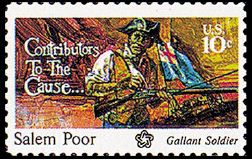 |
| 1975 U.S. Postal Stamp |
Salem Poor's early life was presumably that of any slave born into servitude, but he somehow managed to buy his freedom in 1769. The price he paid for his freedom was 27 pounds. Soon after Poor became a free man, he married another free African-American. Her name was Nancy, and the couple had a son together.
In 1775, war broke out against the British. Salem Poor joined Colonel Frye's Regiment, leaving his wife and son to fight for the colonies. On June 17, 1775, he appeared with his regiment on Breed's Hill to build fortifications against the British. That day, he fought in the battle that would become known as the "Battle of Bunker Hill."
A document exists in the Massachusetts State Archives that describes Salem Poor as a "brave and gallant soldier." It also states that, on June 17, 1775, he "behaved like an Experienced officer, as well as an Excellent Soldier." [sic] It went on to say "to set forth the particulars of his conduct would be tedious." The document is dated December 5, 1775. No less than fourteen officers who witnessed Salem's deeds that day signed it.
The particulars of Salem Poor's service at the Battle of Bunker Hill are not known. However, one can assume that he went beyond what was expected of him to be spoken of in such a way by so many officers, one of whom was Colonel William Prescott. No other man who fought on Breed's Hill that day was honored in such a way. Salem went on to fight at the Battles of Valley Forge, Saratoga, White Plains and Monmouth. His deeds in these battles are unknown as well, but we can imagine that he was no bystander.
Salem Poor appears to have gone back to the life of a barely regarded African-American man in Massachusetts after the war. Despite his gallantry and the sacrifices he made for his country (leaving his family and fighting in a war that hardly benefited him), his life after the war has seemingly gone undocumented.